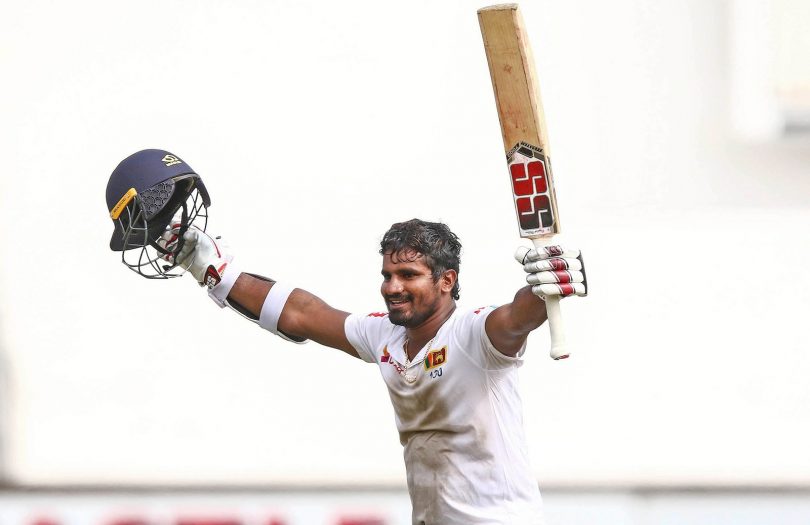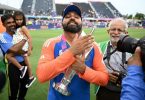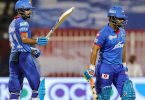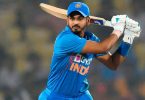Kusal Perera scored a riveting 200-ball 153 to take Sri Lanka to a thrilling victory in the first Test against South Africa in Durban on Saturday, 16 February.
When Keshav Maharaj dismissed Kasun Rajitha to reduce Sri Lanka to 226/9, a South African victory was a near certainty. However, Perera scripted a historic partnership with Vishwa Fernando for the final wicket to take his side past the finish line.
It was a splendid effort by the duo, who added 78 runs between them – a record tenth-wicket stand for successful chases in Test cricket. While Perera dominated the partnership with his blistering effort, Fernando remained resilient with a 27-ball 6.
With the innings , Perera joined elite list of some of cricket greatest players, who produced world class knocks.
Mark Waugh 116 v SA, second Test, Port Elizabeth, March 1997
Australia had played two Test series against the Proteas since their reintroduction following Apartheid – one home, one away – and drawn both. In the first Test of this series, they’d enjoyed an innings victory, but South Africa had fought back hard in this second match. After being skittled for just 108 in their first innings, Australia were left needing 270 to win a match in which neither side had posted more than 209. The tourists were in early trouble at 2-30 when the reassuring presence of Mark Waugh arrived at the crease. Across 228 deliveries and almost six hours, Waugh stood tall in what he later described it as his finest innings. Critics of the more elegant twin had suggested this type of innings was reserved exclusively for his brother. As he had done many times before, Waugh silenced them with a match-winning effort. The gifted right-hander was actually out 12 runs short of the target, leaving a frenzied finale, but Ian Healy’s six sealed a special win for the Australians and a series breakthrough against the South Africans.
Mark Butcher 173no v Australia, fourth Test, Leeds, August 2001
A great Australian side led the series 3-0 going into this Headingley Test and most expected more one-way traffic, particularly after Ricky Ponting (144) and Damien Martyn (118) hammered hundreds to take their side to a first-innings total of 447. The Aussies took a 138-run lead into their second innings and topped that up with another 176 in quick time, before Adam Gilchrist – in charge in the absence of injured regular skipper Steve Waugh – declared with a tick over a day’s play remaining, leaving England needing 315 to win. The hosts fell to 2-33 but on a wearing fifth day pitch, against Glenn McGrath, Jason Gillespie, Shane Warne and Brett Lee, No.3 Mark Butcher produced the innings of his life. Making matters all the more remarkable, left-hander Butcher was only in the side due to a string of injuries. Across more than five hours he defied the Australians, always maintaining a run rate that would get his side home. He dominated a superb 181-run stand with Nasser Hussain (55) before hitting Warne through cover for four to earn the winning runs, finishing unbeaten on 173 from 227 deliveries as England got home by six wickets.
Justin Langer 127 & Adam Gilchrist 149no v Pakistan, second Test, Hobart, November 1999
Australia led this series 1-0 and would go on to clean sweep it, but the importance of this effort was underlined later by Steve Waugh and his willing disciples Justin Langer and Adam Gilchrist, who all maintained this was the victory that convinced them they were capable of winning any match, from any situation. At 5-126 chasing 369 to win on a wearing fifth-day track against an attack containing Waqar Younis, Wasim Akram, Shoaib Akhtar and Saqlain Mushtaq, it’s not difficult to see why. Gilchrist proved repeatedly throughout his stunning career that he was a man for all seasons, but this was the first time Australians realised just what a special product they had at No.7. Playing just his second Test, the keeper-batsman – who quickly won over supporters who had bemoaned the sacking of Ian Healy – batted in his customary aggressive fashion, teaming up with the irrepressible Langer on the fourth evening and immediately upping the Aussie scoring rate. On day five, the pair pushed on, Langer surviving a huge caught behind appeal from Wasim before ultimately departing for a brilliant 127 with just five runs required. Gilchrist remained unbeaten on 149 in an innings later described by Richie Benaud as one of the finest he had seen.
Brian Lara 153no v Australia, third Test, Bridgetown, March 1999
Brian Lara had already proved his genius over the previous nine years. In Barbados, against one of the most dominant teams in history, he took it to the next level. West Indies had been set 308 to win the third Test against Steve Waugh’s Australians in a series that was locked at one-all. Given the overwhelming victory margins of the series’ first two encounters – 312 runs to Australia in Port of Spain, 10 wickets to West Indies in Kingston – only the few remaining optimistic cricket fans in the Caribbean would have tipped against Waugh’s men notching a series-clinching win. What followed was pure batting genius. On the final day, with his side teetering at 5-105, Lara unfurled a series of dazzling strokes, bringing up his half-century by pulling a dishevelled Shane Warne onto the roof of the Greenidge and Haynes Stand. As his sixth-wicket stand with Jimmy Adams grew into triple-digits, Lara followed up one of his knock’s few missteps – turning his head and ducking into a McGrath bouncer – by deliberately shoulder-barging and taunting the towering fast bowler as he walked back to his mark. Adams fell to McGrath but Lara pressed on with the tail, and as the Windies rounded in on an incredible victory, the visitors let slip their last shot when the skipper edged off Jason Gillespie and Ian Healy put down a diving catch. With scores level and the Windies nine down, Lara finished one of the greatest games in Test history with a trademark flowing cover drive, raising his fists as teammates, and soon the Barbados crowd, mobbed their hero. Walsh, not out on 0 at the other end, was among them. “The only way we were going to lose that Test match was if (Lara) got out,” Walsh would later joke. “Because I was not going to get out.”
Graeme Smith 108 & AB de Villiers 106no v Australia, Perth, December 2012
South Africa had never won a Test series in Australia from eight previous attempts but this was the Test that began a shift in fortunes. Mitchell Johnson had run rampant in the Proteas first innings with 8-61, utilising some traditional WACA Ground bounce and finding swing at high pace to hand the Aussies a 94-run first-innings lead. They added 319 to that second time around to leave South Africa with 414 to win; only one team in history had ever managed more. But the pitch stayed true and the Australian bowlers tired as Graeme Smith led his side with a brilliant attacking hundred from the top of the order, setting the tone for what would become an historic run chase. He was out for 108 with the score at 172, but soon after AB de Villiers strode to the middle and picked up the slack as only he could. With Jacques Kallis (57) and then debutant JP Duminy (50no) he controlled the chase expertly, making a composed hundred to lead South Africa to their first Test win at the WACA.
Kusal Perera 153no v South Africa, Durban, February 2019
Sri Lanka had been beaten in New Zealand and thrashed in Australia, and given the quality of the South African pace-bowling attack, the third leg of their southern hemisphere tour loomed as the most daunting. In Durban however, Kusal Perera was in the mood for disregarding reputations. Playing the Proteas for the first time, the 28-year-old stood tall in the first innings by top-scoring with 51 in his side’s total of 191. But there was much more to come. South Africa set Sri Lanka 304 to win the Test, and with Sri Lanka having been bowled out for less than 240 in their seven previous innings, looked absolute certainties to take a one-nil lead in the two-match series. The tourists duly stumbled to 3-52, and by the time they reached 9-226, the Test appeared to be sticking to script. Perera however, then managed to keep most of the strike and played some audacious strokes, including two sixes off fast bowler Dale Steyn and one each off Kagiso Rabada, Duanne Olivier and Keshav Maharaj. The left-hander scored 67 of his runs in an unbeaten 78-run last-wicket stand with Vishwa Fernando – a first-class record for the tenth wicket in a winning cause – to give his underdog team a sensational victory.







